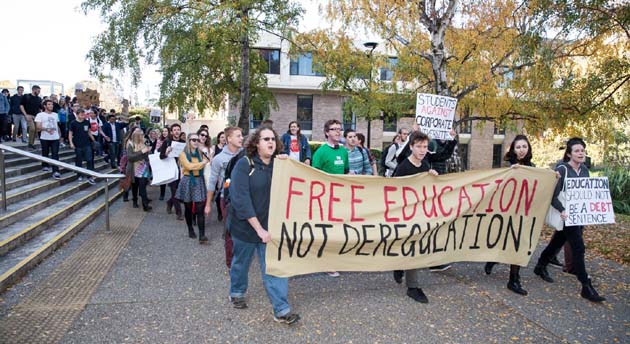The government’s plans to deregulate university fees and cut funding are almost universally despised, with close to 70 per cent opposing them in polls.
This unwavering public opposition is why the Senate has, so far, held fast, voting the legislation down first just before Christmas in 2014. But we can’t rest easy just yet.
Education Minister Christopher Pyne is putting the legislation to the Senate again, with a vote likely by late March.
His second attempt (despite spending a cool $15 million on propaganda advertising) is likely to end the same way as his first.
Three of the cross-bench Senators Pyne needs to get deregulation through, Nick Xenophon, Jacqui Lambie and Ricky Muir, backed a motion in February to investigate alternatives to deregulation, with an inquiry reporting on 17 March. It also had the support of the Palmer United Senators, Labor and The Greens. As Greens MP Adam Bandt pointed out, “Christopher Pyne is a pretty slow learner.”
But the cross-bench Senators might well turn out to be the saviours of fee increases.
Pyne’s plan for deregulation, along with a 20 per cent cut in university funding, would give universities complete freedom to set fees, quickly creating dramatic fee increases.
But instead, some University Vice-Chancellors and MPs are pushing for the government to increase the caps on fees, without deregulating them completely.
This would mean fees would go up, but within limits set by government. Clearly, it’s not principle, but populist pragmatism, that has driven their opposition to deregulation so far.
Independent Senator Nick Xenophon has offered his support to this plan for fee increases, as have the Vice-Chancellors at UTS, Victoria University and Swinburne University.
The Group of Eight, the club of elite universities that has been a supporter of deregulation all the way through, is pushing for negotiations to continue.
While Pyne says deregulation is at the “heart” of the government’s plan, he’s open to the call for a capped fee increase. Meanwhile they are threatening that $150 million in funding for research will be stalled until deregulation passes.
Show me the money
For the Vice-Chancellors and most of those in the Senate, there’s no question of where the funds should come from: out of the pockets of students. The just disagree over how quickly to bleed students dry.
In 1974, 90 per cent of university funding came from government. Now, funding for higher education has been chopped back to the extent that it makes up less than half of most institutions’ revenue—government funding accounted for an average of 42 per cent of revenue based on universities’ 2012 annual reports.
The funding has come from two sources, students and corporate donors.
The higher fees get the more working class students will think twice about ever going to university. Student fees have increased a hundredfold since they were introduced by Labor in 1989, according to The New Daily. The average four year bachelor degree now costs between $18,000 and $30,000, while medicine, law and other science degrees can cost more than $60,000.
Universities now fall over themselves to compete for corporate grants and philanthropic donations, and in the process have become more and more beholden to the priorities of business and the rich.
As the architects of HECS-HELP, Labor have no problem with fees. Christopher Pyne loves to point out that many Labor figures, such as John Dawkins, who introduced HECS under the Hawke Labor government, along with well-known former MPs Gareth Evans and Maxine McKew, support fee deregulation. Real funding per student decreased under the last Labor government.
University students and the National Tertiary Education Union (NTEU) have stood strong against deregulation. With rallies planned around the country on 25 March, it’s time to make the case loud and clear against any increases in student fees.
Instead, education can be free. In 2014, Germany made all higher education free, including to international students. Chile, following three years of student demonstrations, is now doing the same.
Right now, Australian spending on higher education is below the OECD average. Even a developing nation like Mexico manages to spend as a percentage of GDP than Australia.
Some people are swimming in cash that could fund education. Cutting business income tax concessions could raise $10 billion a year. Andrew Forrest’s Fortescue Metals has paid no tax in the last 18 years, whatsoever. The effective corporate tax rate for the richest 200 companies is 23 per cent, due to tax loopholes on the official 30 per cent rate. But rather than tax the rich, the Coalition wants to increase the burden of fees on students.
It’s time we made them pay.
By Amy Thomas






